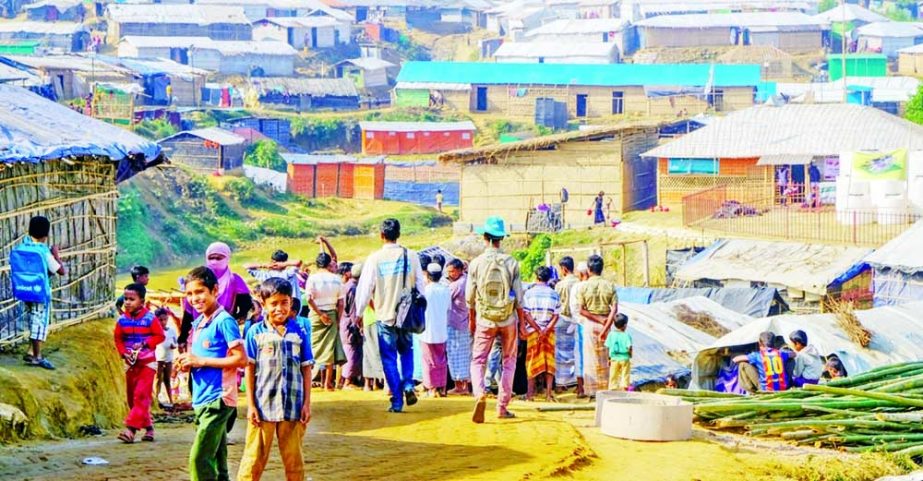
Al Mamun Harun Ur Rashid :
In 2017, over 700,000 Rohingyas fled their homes in Myanmar to Bangladesh in a bid to escape horrific violent and human rights abuses in Rakhine State by Myanmar Army Tatmadaw.
August 25 will make their fifth year of forced exile from their home country, Myanmar.
The internally displaced Rohingyas are now living in the sprawling camps of Cox’s Bazar as refuges adding huge pressure on host community and environment.
The Rohingyas also put huge pressure on Bangladesh economy.
The persecuted Rohingya populations wish to return to their homes in Rakhine State, but very little has been done to create a safe environment for their repatriation.
The international community also failed to come out with any pragmatic measures to force Myanmar to get back their nationals.
Bangladesh and Myanmar also signed deal for Rohingya repatriation.
“Myanmar has not taken a single Rohingya back home till date although the crisis enters the fifth year on August 25,” said a foreign ministry official.
He added: “A safe and conducive environment is required for a safe and sustainable return in Rohingyas to their homeland.”
Diplomatic sources said that Bangladesh would face more troubles in the upcoming days if the process of the repatriation does not commence soon.
On the one hand, Bangladesh is bracing resource constraints to provide minimum support to this huge population and on the other hand, the number of Rohingya population is increasing alarmingly adding more mouths every year.
Foreign Ministry sources said that every year on an average 30,000 Rohingya babies are being born and they need more nourishment and other needs.
According to this estimate, the total Rohingya population is now over 12 lakh, which is ultimately a major challenge for the host community to deal with.
Meanwhile, Bangladesh has requested the United Nations to take immediate measures to introduce family planning among the Rohingya communities.
Foreign Secretary Masud Bin Momen on Sunday said, “We have requested the United Nations to introduce family planning among the Rohingya families. They would begin the programme soon. A draft agreement has been formulated for it. It will be finalised soon.”
“The Regional Coordinator of UNFPA visited Bangladesh recently. I said that every year 30,000 new Rohingya babies
are born. As a result their number is increasing rapidly,” he further said.
According to the UN Refugee Agency (UNHCR), more than 7,73,972 Rohingyas had fled to Bangladesh since 25 August 2017. Till July this year, the registered Rohingyas are 9,36,733.
During the Taskforce meeting on Sunday, representatives of different ministries along with the UN Resident Coordinator were present.
The UN representatives said that the UN started its small projects in Rakhine State to create a congenial atmosphere and the Rohingyas would be involved in those activities.
Except the international promises, Bangladesh has no option left but to wait when the time would be matured for the repatriation.
Due to the tremendous pressure of Rohingyas in the Cox’s Bazar camps, Bangladesh has already relocated some of the Rohingya families to the remotest island Bhasanchar to ease the pressure to some extent.
Foreign Secretary said, “So far 30,000 Rohingyas have been relocated to Bhasanchar. The UN has not been involved here fully. The local NGOs are ensuring food for the Rohingyas there.”
During the Taskforce meeting, the WFP representative assured Bangladesh that they would begin their activity in Bhasanchar very soon. If they get engaged there, the Rohingyas will have no problem to get access to food till December-January, the Foreign Secretary added.
Despite these stopgap initiatives, the experts said that the commencement of the repatriation process is much more important because Bangladesh would not be able to carry this burden for a long time.
Within the five years, both national and international communities have witnessed degradation of the law and order situation in the Rohingya camps where killings, drug dealings and other anti-social activities are taking place frequently.
Even the recently visited United Nations High Commissioner for Human Rights Michelle Bachelet expressed her concern about deterioration of the security issues in the camps.
She said that she had seen ‘hopes’ in the eyes of the young Rohingya communities for their return to their homeland and she also wants a dignified and sustainable repatriation.
Meanwhile, Chinese Foreign Minister Wang Yi assured Bangladesh that China would facilitate the Rohingya repatriation to the Rakhine State, where they had already constructed 300 houses and offered to provide food for them for three to four months when they return.

